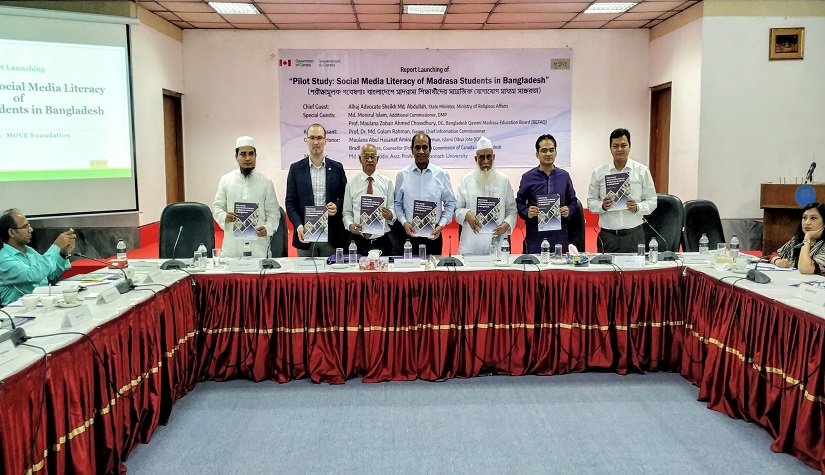Online radicalization heightening for lack of literacy
- 47 percent madrasa students remotely know about cybercrime while 22 percent have no idea, finds study- By Md. Kamruzzaman
- 30 June 2019, 11:19

A new study finds that the risk of online radicalization among some Islam-based madrasa students is heightened due to limited digital literacy, hindering their ability to discern between information and disinformation.
“Many [madrasa] social media users remain unaware about cyber-crimes, including the legal framework against extremist content”, study entitled “Pilot Study: Social Media Literacy of Madrasa Students in Bangladesh” unveiled the information today [Sunday] in Dhaka.
The pilot study focuses on the social media literacy of madrasa students belonging to both Qawmi and Alia streams, who are aged 16 to 22 years and studying in the higher secondary level and above.
MOVE Foundation, a de-radicalization and peace-building local youths’ organization, carried out the survey of 825 students, both male and female, from 36 madrasas (23 Qawmi and 13 Alia) of 12 districts in the country.
“Facebook, Instagram, You Tube, Twitter etc. are popular social media tools amongst the youths of Bangladesh”, the study finds.
It urges on active role of Islamic clerics in social media for building awareness among youths against radicalization.
“Real Alims [Islamic clerics] should be active in social media against extremism”, Additional Commissioner of Dhaka Metropolitan Police Md. Monirul Islam said, who attended the program as special guest.
Islam urges madrasa authorities and students for developing contents against extremism and assures that in case of need government will financially help them.
He warns that terrorist recruiter act very carefully and target youths based on their social media performance. “Please be careful before liking or sharing any content in social media”.
He informed that in 2008 only 0.6M people used facebook in Bangladesh while within a span of 10 years the number of facebook users stands 93M. “The position of Dhaka in using facebook is second in the world after Bangkok”.
“Social media is a good platform for spreading the real teaching of Islam”, Professor Maulana Zobair Ahmed, Director General of Bangladesh Qawmi Madrasa Education Board said, adding that a vested quarter is vitiating social media in the name of Islam. “We have to seize those viruses”.
The study also finds that most of the social media users are not aware of radical contents and go through those just to satisfy their curiosity. “Majority [65%] prefers to browse social media to satisfy their curiosity without engaging in debates or raising questions”.
It added: “More than two-third respondents [67%] look religious education or religion-related content, 11% entertainment, 15% sports and 7% political”.
Pointing to more religious interest among females, the study further said: “Female Qawmi respondents show more interest specifically in religious educational content [96%], whereas male Qawmi and Alia respondents find more interest in religion-related contents [66% and 54% respectively]”.
To tackle the online radicalization risk, the study recommends on joint efforts. “The government, private sector and civil society can work together to improve access and digital literacy amongst madrasa students, which can result in responsible, safe and productive utilization of technology”.
“The government and the security forces can establish partnership through civil society platforms with religious leaders and educational institutions to improve digital literacy amongst youths, raise awareness against cybercrime and extremist content, disseminate counter-radicalization messages and promote peace building.”
It is important to develop a culture of lawfulness in online behavior by raising awareness amongst youths about the legal framework against cybercrimes, including disseminating fake news, hate speeches and extremist ideology, the study added.
The program was attended, among others, by Professor Dr. Md. Golam Rahman of Dhaka University, Islami Oikya Jote Vice Chairman Maulana Abul Hasnat Amini, Political Counsellor of Canadian High Commission Bradley Coates and Md. Saidul Islam of Iran Cultural Centre in Dhaka. Assistant professor of Jagannath University moderated the program.
More News
-
- ৫ঃ ৪০
- খেলা
-
- ৫ঃ ৪০
- খেলা

